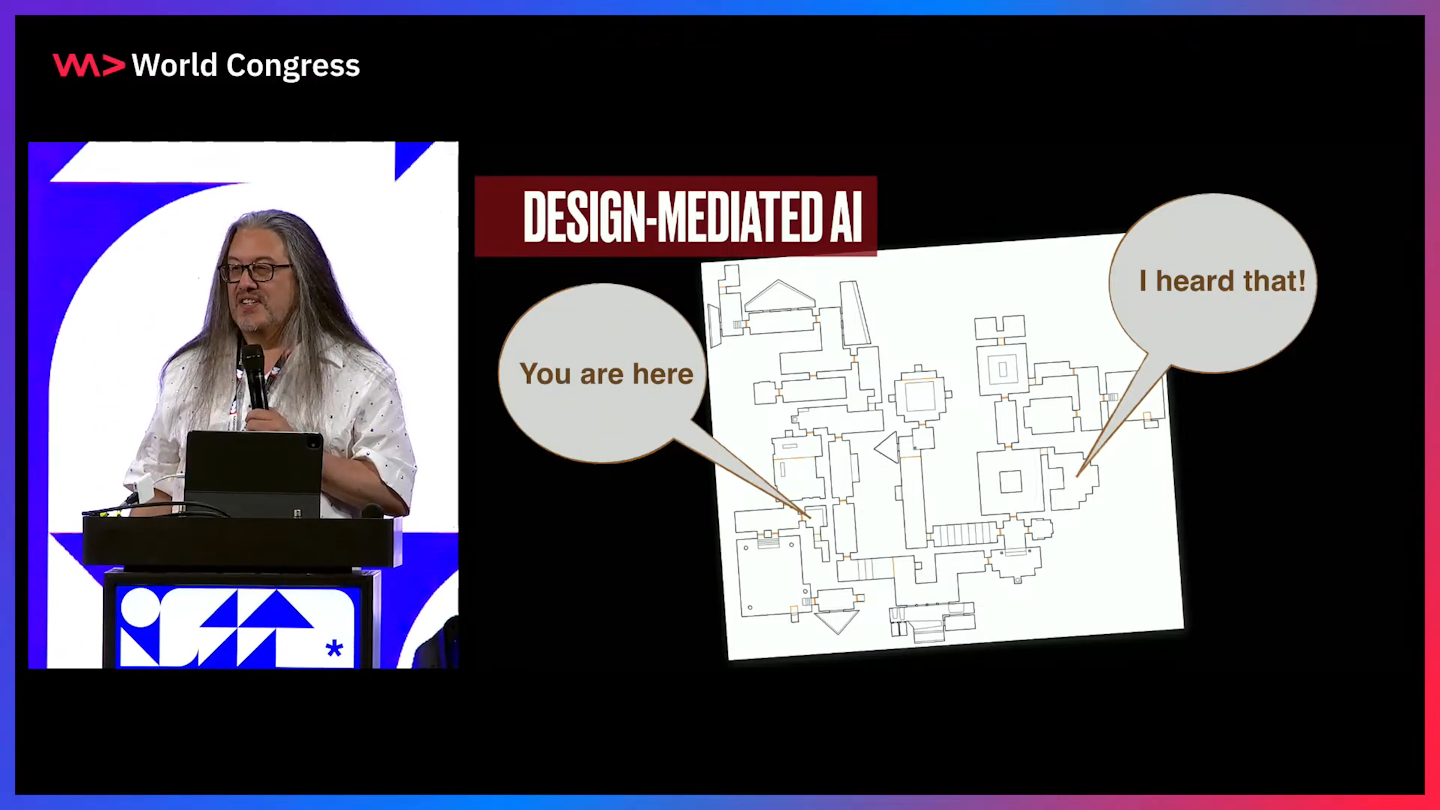John Romero, fabled games developer and, well, "The Doom Guy", returned once again to WeAreDevelopers World Congress to deliver an excellent keynote on gaming and AI. You can check out the video in our watch section and read up what he had to say here!

Here's the details of what he had to say:
Today I have the pleasure of taking the stage at We Are Developers again. I’ve been here pretty much every year, and it’s always a great experience. This time, I'm diving into what AI can, can’t, and shouldn’t do for games. And just for the record, this presentation wasn't made by AI—yet another rarity these days!
I've been involved in coding and game development since I was 11 years old. Check out this picture of me at 15, rocking a double monitor Apple II Plus setup:

In my 40+ year career as a technologist, AI stands out as the single greatest tech leap since the Internet. It’s taken many by surprise, and to give you some perspective: I’ve seen computers go from simple tasks to the phenomenal capabilities they have today.
What Do We Mean by AI?
AI has been around since the dawn of computers. Nowadays, when people talk about AI, they usually mean generative AI. This type of AI generates new content like text, images, music, or other data types based on the input it receives.
Generative AI can produce content that challenges but doesn’t yet pass the Turing test. Still, it performs some pretty amazing feats—from generating text to creating artwork. And of course, everyone in finance thought, “Great, let’s make it rain money by automating everything!” But, spoiler alert, that didn’t go so well.
AI in Game Development

Let's focus on how game developers are currently using AI. Earlier this year, the Game Developers Conference released their state of the industry report. For the first time, AI was a major topic, highlighting how fast the field has evolved. They surveyed developers about their use of tools like GitHub Copilot, ChatGPT, and Adobe Generative Fill.
Nearly half of the respondents said their studios were using generative AI. Here's a breakdown:
- 31% used AI themselves
- 18% did not use it, but their colleagues did
- 15% did not use it but their studios were interested
- The rest had no interest or were unsure
The usage varied by role within companies, too. For instance, 44% of people in business and finance used AI tools, compared to just 16% of those in art-related roles and 13% in narrative roles.
AI Adoption Concerns
Despite its potential benefits, some developers are cautious. For example, 21% of AAA studios—typically creators of blockbuster games—prohibited the use of AI entirely. This number drops to 12% for smaller developers.
At Romero Games, we don’t use generative AI in any aspect of our game development—not in AI or art, code, audio, writing, or even design. We firmly believe that while AI can be a super Google for research, it still has its pitfalls. For example, AI once told me that I was born in Guatemala and raised by my Mexican grandmother, neither of which is true!
Why Some Developers Avoid AI
Creating games is incredibly expensive, with AAA game development averaging around $75 million. AI might seem like a shortcut to reduce costs, but ethical concerns abound. A whopping 84% of game developers expressed concerns about the ethics of AI use, and only 12% were not concerned at all.
Most developers prefer AI to automate processes and make creative work easier, rather than replace the creative work itself. Using AI creatively yet ethically is a fine line to walk.
Traditional Uses of AI in Games
Although we refrain from generative AI, traditional AI has been a staple in game development for decades. Let's look at some classic examples and methods:
Pathfinding AI
In Doom (1993), cacodemons would use pathfinding AI to find their way to the player or enemies that damaged them. Techniques like the A* algorithm helped calculate the shortest paths.
Finite State Machines
Red Dead Redemption 2 uses finite state machines to manage NPC behaviors, enabling them to patrol, attack, flee, or take a drink based on certain conditions or events.
Decision Trees
Strategy games like Age of Empires IV use decision trees to help agents make decisions based on specific conditions, planning their short-term and long-term actions.
Behavior Trees
Halo 2 (2004) used behavior trees to manage complex enemy behaviors. These trees consist of nodes defining actions like moving to cover or throwing grenades, and they can be reused for various enemies.
Utility AI
Utility AI evaluates and scores actions based on their usefulness, often seen in racing games and simulations. It's perfect for ensuring realistic NPC movements.
Steering AI
Control the direction and speed of NPCs to achieve goals like seeking or avoiding obstacles, commonly used in racing games.
Procedural Generation
Minecraft leverages procedural generation to create endless worlds, generating trees, dungeons, and more based on algorithms.
Scripted AI
Games like Baldur's Gate and many others use scripted AI for controlling specific sequences and events based on predefined triggers.
Design-Mediated AI
One notable use is design-mediated AI. For instance, in Wolfenstein 3D (1992), we used sound zones to create suspense, manually activating enemies elsewhere on the map, driven by player actions.
Example:
In the Civilization series, Sid Meier discussed a scenario with a beta tester who expected a 33% chance of winning against enemies. Despite three continuous losses, Sid modified the AI to ensure a win on the third try, even if this wasn’t how random number generators typically work. This tweak aimed to enhance player experience, showing how designer intervention can override AI to improve gameplay.
Beyond Traditional AI: Limitations and Challenges
Despite AI’s capabilities, there are limitations. Back in 1993, during the development of Doom, innovation stemmed from human creativity. Our goal was clear: create something no one had seen before, and we succeeded. This wasn’t a derivative work, but a ground-breaking development.
AI’s Inability to Innovate
AI, inherently derivative, is built on existing knowledge. While it can find new uses for medications and parse data swiftly, true innovation—like what we accomplished with Doom—requires genuine creative insight. I challenged AI to pitch an innovative FPS comparable to Battlefield or Fortnite, and it fell short:
"Echoes of Eternity is a groundbreaking first person shooter that merges intense combat with a deeply immersive narrative, procedural world building and advanced AI technology."
Using buzzwords like "groundbreaking" doesn’t suffice. When pressed further, AI suggested integrating quantum mechanics and real-time emotional AI with multi-sensory feedback. While innovative on paper, practical and market feasibility remains questionable.
Ethical and Legal Concerns
Ethically, AI-generated content brings legal concerns, especially regarding copyright. For instance, AI-generated art, presently entering the public domain post-creation, lacks copyright protection in the U.S. Complex legal issues arise when AI assists in generating artwork or literature, leading platforms like Steam to demand disclosures on AI-generated content to limit liability.
Data Ownership and Privacy
Beyond copyrights, data fed into AI systems can also resurface unexpectedly. Questions and data used contribute to large datasets, posing privacy concerns. Not every AI user is aware of this, which adds another layer of complexity.
The Future of AI in Creativity
As a technologist, I recognize AI’s revolutionary potential. It’s a paradigm shift, akin to the dawn of the Internet. While AI's utility in creating next-gen games like Minecraft or Fortnite remains skeptical, I believe in its role as a tool, not the creative genesis.
Ultimately, humans—the right people at the right time with the right idea—drive innovation. Lightning striking from AI alone is improbable, and using AI marks a step into uncharted legal waters. Creativity, fun, and passion drive the games we create, and I hope AI remains an exceptional tool that augments, not replaces, this creative spirit.
Thank you for joining me on this exploration of AI in game development. I hope you enjoyed it, and if you’re interested, my autobiography, Doom Guy, is available near stage one!











